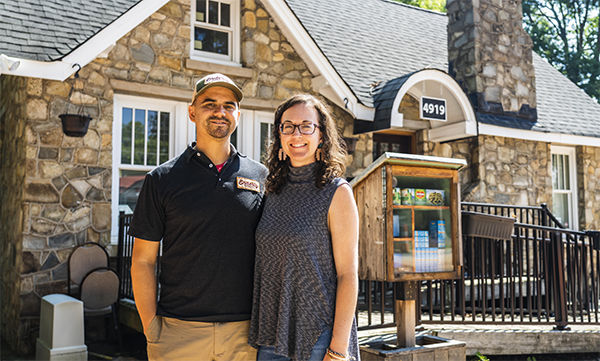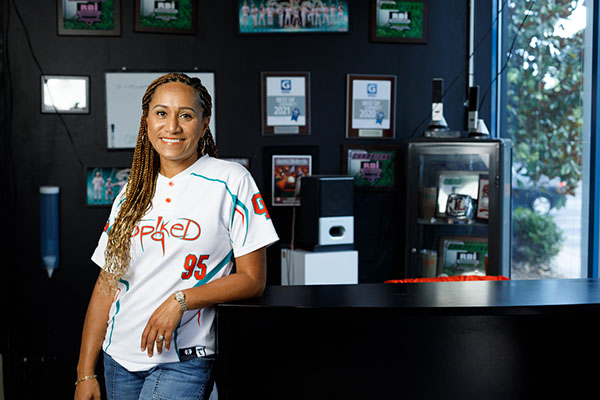
Growing up in the Washington, D.C., area, Robert Johnson didn’t admire the tough guys in his neighborhood. Instead, he met his role models at the local rec center where he played basketball. They were professionals: doctors and certified public accountants.
“And you never knew how successful they were until they sat down and took the time to invest in you and give you some advice,” says Johnson, vice president of the Truist commercial banking group. “It was seeing someone who looked like me, who was successful but still cool. I remember saying, ‘That’s what I want to be. I want to be this guy who has peace of mind and is doing the right thing.’”
Today, he hopes to be that guy when he meets with middle and high schoolers, many of them from low-income neighborhoods like the one he grew up in.
But as a volunteer for Junior Achievement of Greater Washington, Johnson isn’t just a role model—he’s a mentor, one of many Truist teammates helping empower young people with financial tools they’ll use for the rest of their lives.
Learning the value of good money habits
There’s the middle school student who asked informed questions about investing in stocks and mutual funds. The teenager who sent a series of gushing text messages thanking her mother for taking on the financial challenges of parenthood. The eighth grader who was the only English speaker in her family and chipped in with the bookkeeping.
“She knew her parents had been struggling financially,” says Chelsea Soneira, chief academic officer at Junior Achievement of Greater Washington. “She put all the bills on the table and she fixed it. She was able to say, ‘I know how to do this.’ And she was able to get everything back on track financially for the family.”
Stories like these emerge often from Junior Achievement of Greater Washington, which helps tens of thousands of students build financial confidence and get hands-on experience with budgeting, entrepreneurship, and key business principles.
A Junior Achievement Finance Park facility resembles a sort of mini city, complete with working storefronts, where a middle school student takes on a fictional life scenario—including a career and credit history—to prepare them for real-life financial challenges.
“They not only have to conduct research on how to match their personal values with the reality of their income, but they’ll craft their own budget, they’ll go shopping, and they’ll pay their bills,” Soneira says. “What we love about it, amongst other things, is that it’s a safe space to mess up.”
At the high school level, Junior Achievement mentors also work with students on case studies from area businesses, including Truist.
Volunteers like Johnson, whether they’re walking kids through the Finance Park or engaging them in the classroom with real-world solutions, are helping young people learn important lessons about managing their money.
Middle schoolers and high schoolers may not always listen to their parents. They may not always listen to their teachers. “But if another person tells you the same thing, you might listen, and it might just light that spark for you,” Soneira says.
Connecting the classroom and the real world
Truist Financial Corporation, together with Truist Foundation and Truist Charitable Fund, committed $1.45 million to Junior Achievement of Greater Washington in 2022, and teammates have been involved with the program for years. Truist has also sponsored the development of a digital educational experience, and local Junior Achievement branches from Tampa Bay to Atlanta team up with Truist teammates in their respective regions.
In the Washington area alone, Junior Achievement reaches more than 50,000 students every year, and it has big expansion plans. The curriculum is practical and focused on lessons that students can apply to their own lives, including lessons about spending and saving as well as assessing career opportunities.
“While students may learn in a classroom-like setting, putting these concepts into practice is really important,” says Jennifer Bodensiek, chief development officer at Junior Achievement of Greater Washington. “It’s a real eye-opening experience when students see how they can start putting all this together.”
Young people in Junior Achievement programs are not just learning financial literacy; they’re also learning how businesses support communities, and how people support one another.
“It’s so important for students to see what the community looks like, and the businesses and people that are in that community,” Bodensiek says. “That includes the mentors who share how they got to where they are. Just sharing your journey with students is so very important. That connection brings a lot of this to life.”
Realizing your potential
When Johnson was a kid, his family didn’t have a lot of money. There were few people he could go to for advice on making a budget, or starting an emergency savings account.
“A financial mistake in my world, it could have almost been life-threatening,” he says. “I’m really in tune with that when I talk to some of the kids. They haven’t had the opportunities to gain financial literacy that others have had. That’s part of what motivates me to give back—to create an even playing field. I see kids who have all the potential in the world, and if they get the right support, they’ll have a really bright future.”
Part of what he does with Junior Achievement is help young people figure out who they want to be. By helping students learn to budget, or to think through a business plan, Johnson is helping them take control of their own lives.
“My purpose in life is to help as many people as I possibly can,” he says. “That’s why I was put on this earth. And so Junior Achievement really hits home.”


